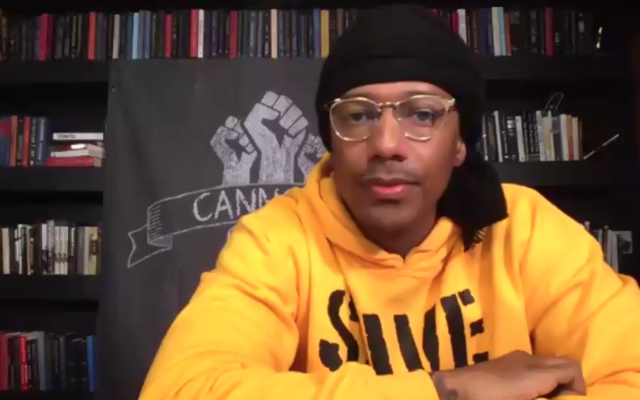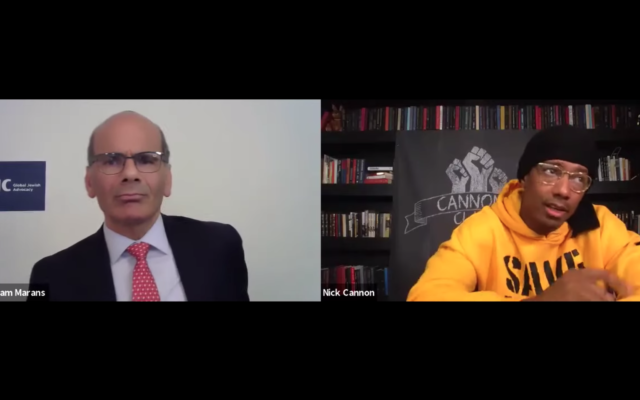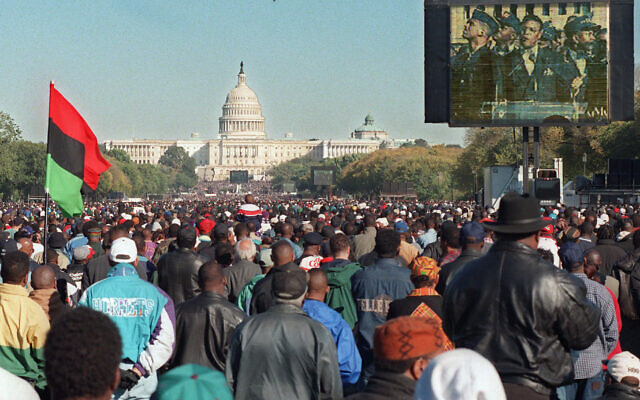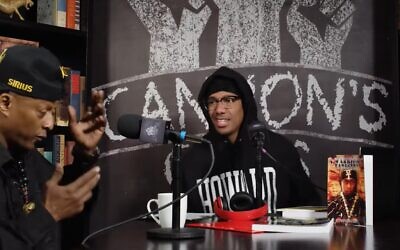In online conversation with Jewish group, entertainer says apology has been just one part of process in making amends; reveals his great-grandfather was a sephardic rabbi

NEW YORK — Media icon Nick Cannon said Monday that he accepted being a “sacrificial lamb” for the the entertainment world, as he reflected on the process of atoning in the wake of the fallout for remarks he made during a podcast that were widely criticized as anti-Semitic.
During an online conversation hosted by the American Jewish Committee, Cannon recalled how colleagues and friends had reached out with offers to publicly defend him, which he rebuffed as he came under fire last month.
“What I did tell them [was]… ‘let’s clear the air and let’s atone first, and then through our influence, with the right words and the correct terminology, let’s talk about… how we can operate as one,” Cannon said.
The comedian, rapper, and TV host recognized that he “set off quite a few hurtful alarms” with his comments on the “Cannon’s Class” podcast.
In that June episode — which prompted his firing from ViacomCBS — Cannon contended that Black people are the true Hebrews and Jews have usurped that identity.
He then argued that lighter-skinned people — “Jewish people, white people, Europeans” — “are a little less” and have a “deficiency” that historically caused them to act out of fear and commit acts of violence to survive.
Cannon also discussed anti-Semitic conspiracy theories involving “the Rothschilds, centralized banking, the 13 families, the bloodlines that control everything even outside of America.”
“They had to be savages,” he said, before going on to praise the anti-Semitic Nation of Islam leader Louis Farrakhan.
“It’s never hate speech, you can’t be anti-Semitic when we are the Semitic people,” Cannon said. “When we are the same people who they want to be. That’s our birthright. We are the true Hebrews.”

Cannon apologized in a series of posts on Twitter days later, saying his words “reinforced the worst stereotypes of a proud and magnificent people and I feel ashamed of the uninformed and naïve place that these words came from.”
During the Monday Zoom conversation with AJC’s Rabbi Noam Marans, Cannon added that while his initial apology was “a step. Atonement is a process.”
Part of that process has been “educating” himself on Jewish history and culture and speaking to leaders in the Jewish community, he said.
He said AJC had “sent him a lot of literature,” which led him to realize how remarks, like the ones he made on his podcast, had been “used as propaganda in the Holocaust.”
Over the past several weeks, Cannon said he has gone on a Chabad-run tour of the ultra-Orthodox community the Crown Heights neighborhood of Brooklyn and experienced a Friday night Shabbat dinner. He even observed the Tisha B’av fast day late last month and reviewed former New York Times editor Bari Weiss’s book, “How to fight anti-Semitism.”
He also mentioned speaking to former NBA star Amare Stoudemire, who now lives in Israel, about building community centers for disenfranchised Blacks and Jews.
During a subsequent question and answer segment, Cannon was asked to denounce Farrakhan. The TV host explained that while he condemned any “hateful” rhetoric the Nation of Islam leader has used, “God has not given me the power to throw away or condemn anyone.”
“In our community [Farrakhan] is a leader… He put together the greatest peace gathering in the history of the world” he said, referencing the 1995 Million Man March for civil rights in Washington.

“I can’t be accountable for what others have done,” he continued. “We must condemn hate or demagogy, but we’re not in a position to throw anyone away.”
However, he later added, “if my goal is to truly break down walls and barriers in community and bring us together, I’ll be that sacrificial lamb.”
Farrakhan, 87, is known for his anti-Semitic and homophobic rhetoric. He has praised Hitler, accused Jews of controlling the US government and railed against what he calls the “Synagogue of Satan.”
But he’s also known for empowering Black activism, organizing social service programs in low-income Black neighborhoods and advocating for Black self-reliance decades after he organized the Million Man March, a rally that brought hundreds of thousands of Black people to Washington, DC.
While discussing the state of Black-Jewish relations, Cannon revealed that his “great grandfather was a Spanish rabbi.”
“So as much heat as I’ve been catching from the public and the outside, this hit home for my family in a real way because I come from a Black and [have] Jewish family on my mother’s side,” he said.
Cannon highlighted the role Jewish community leaders played during the Civil Rights movement and added “we need the Jewish community to be part of movements in 2020 as well.”

He recognized the that the two communities “share oppression” but added that “it doesn’t have to be the oppression Olympics. Let’s galvanize our positive energy and compassion and use it as a defense against the hate.”
The media personality went on to warn against “allow[ing] the media to sensationalize” the suffering of the two communities with hashtags, which he claimed cheapen the issues.
Reacting on Twitter as the Live conversation unfolded, a number of activists took issue with the absence of Black Jewish voices in the discussion along with Cannon’s plea for them to “step up.”
“.@NickCannon, Black Jews and other Jews of Color *have* been stepping up. It’s time for *other* people to step up and actually *listen* to what we’ve been saying this whole time,” tweeted MaNishtana, an activist rabbi whose real name is Shais Rishon.
Separately taking issue with Marans’ efforts to push Cannon to publicly denounce Farrakhan, Rishon wrote, “I would ask the AJC, et al, if they understand that continuing to force apology tours with white Jews only serves to strengthen the underpinnings of the [anti-Semitic] trope of Jews being white people that are outside the bounds of criticism, thus fomenting more resentment.”
“Y’all always want folks to rebuke Black people for antisemitic tropes. Yet your silence when Jewish folks are racist is noted daily,” tweeted Koach Frazier, a black rabbinical student and co-founder of Tzedek Lab, a network of Jewish activists.
As reported by The Times of Israel
